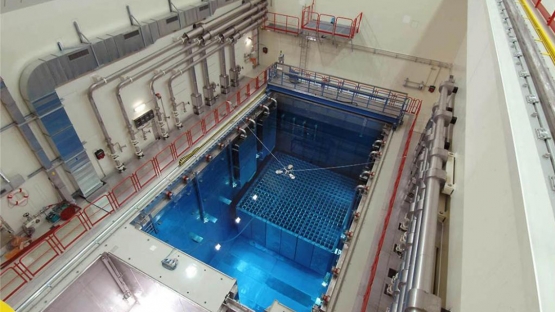Used nuclear fuel management is one of the chief challenges to nuclear power production. There is currently no long-term waste storage solution available in North America, so reprocessing used fuel from the pressurized water reactors (PWR) found in the US nuclear industry fleet and Canadian Deuterium Uranium (CANDU) reactors could help to reduce the waste and make more efficient use of the resource. Esteban Gonzalez is a recent graduate who worked with Center for Nuclear Security Science and Policy Initiatives (NSSPI) Director Dr. Sunil Chirayath to examine the proliferation resistance of reprocessed used nuclear fuel from PWRs and CANDU reactors to make sure that it does not pose a nuclear proliferation threat.

“Recycling of spent nuclear fuel would utilize material which would otherwise be stored idle for several decades to come without a final disposition until a policy is established for the ultimate disposal of it,” explained Gonzalez. “This would also diminish the quantity of material which otherwise could be stolen or misplaced and end up in the hands of a proliferator.”
Gonzalez performed fuel burnup simulations by modeling a portion of the CANDU reactor core using the Monte Carlo radiation transport code (MCNP) and estimated the uranium isotopics in the used fuel at discharge after it is recycled multiple times. He found that along with the reduction in waste comes an enhancement of the proliferation resistance. This means that it becomes increasingly difficult for a proliferator to configure a nuclear explosive device using this material.

Gonzalez hopes that his study can contribute to a means to reduce the amount of spent fuel waste on-site at reactors and at interim storage facilities. He also pointed out that used fuel discharged from a PWR is a potential fuel source in a CANDU reactor.
“Our study showed that a reduction in the waste produced by reactors is attainable by re-processing and recycling spent fuel,” he said. “Ultimately this study can pave the way for a relationship between Canada and the USA to minimize the Spent Nuclear Fuel sitting idle at interim storage facilities which have the possibility of getting stolen or even leaking into the environment within a corroded cask for years to come. At the moment, with no indefinite solution to the waste storage problem, alternative solutions need to be explored.”
Gonzalez said that one experience he had as a NSSPI student really helped bring home the importance of his work on proliferation resistance studies for used fuel reprocessing. When he visited Japan in March of 2023 as part of the International Nuclear Facilities Experience, he was exposed to the “immense undertaking that is reprocessing of spent nuclear fuel.” According to Gonzalez, “The experience of touring Rokkasho Reprocessing Plant was eye-opening and showed what a country with a dedication to being safe and reducing waste can accomplish. Society as a whole needs not to dwell on the past that once was but look forward and pave a way for future generations to thrive in a clean and sustainable environment.”
In May, Gonzalez earned his M.S. degree in nuclear engineering with a specialization in nuclear nonproliferation from Texas A&M University. Prior to joining NSSPI, Gonzalez received his B.S. in Chemical Engineering from the New Jersey Institute of Technology. As part of the Dr. G. Robert Keepin Nonproliferation Science Summer Program, he has had the opportunity to intern at Los Alamos National Laboratory during his graduate studies under the mentorship of James Tutt in the Intelligence and Space Research group. In the fall, he will continue his education as a Ph.D. candidate in the nuclear engineering department.